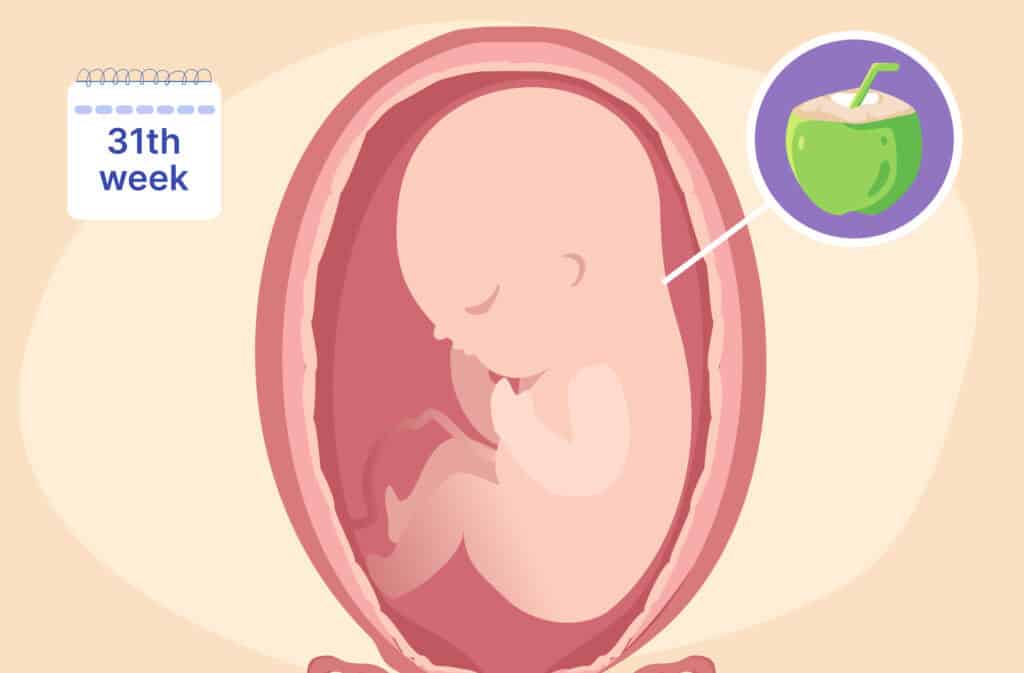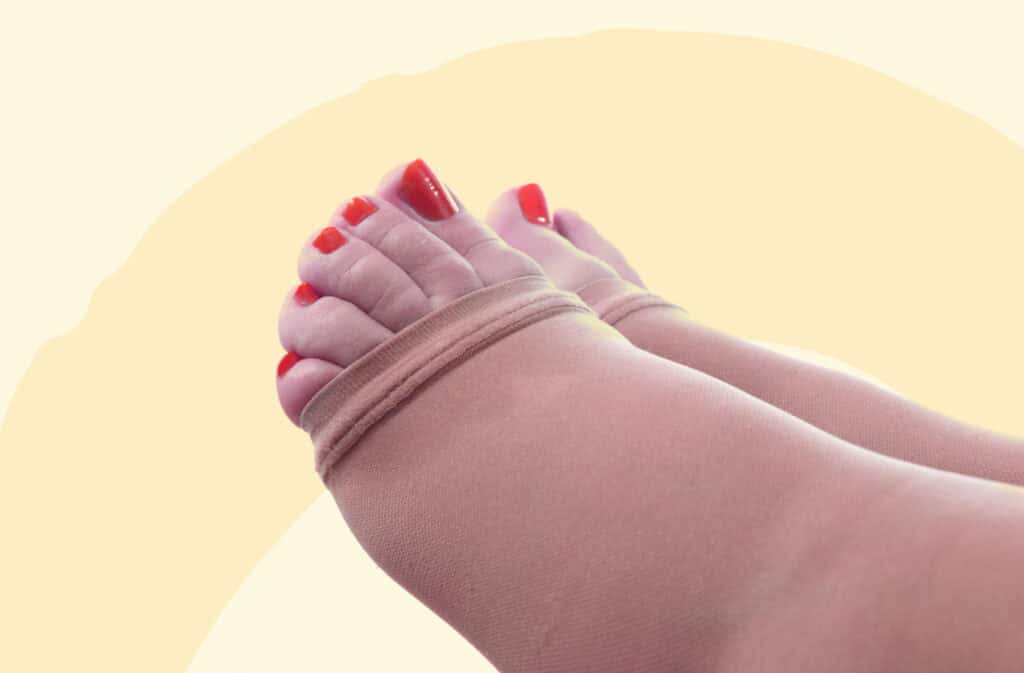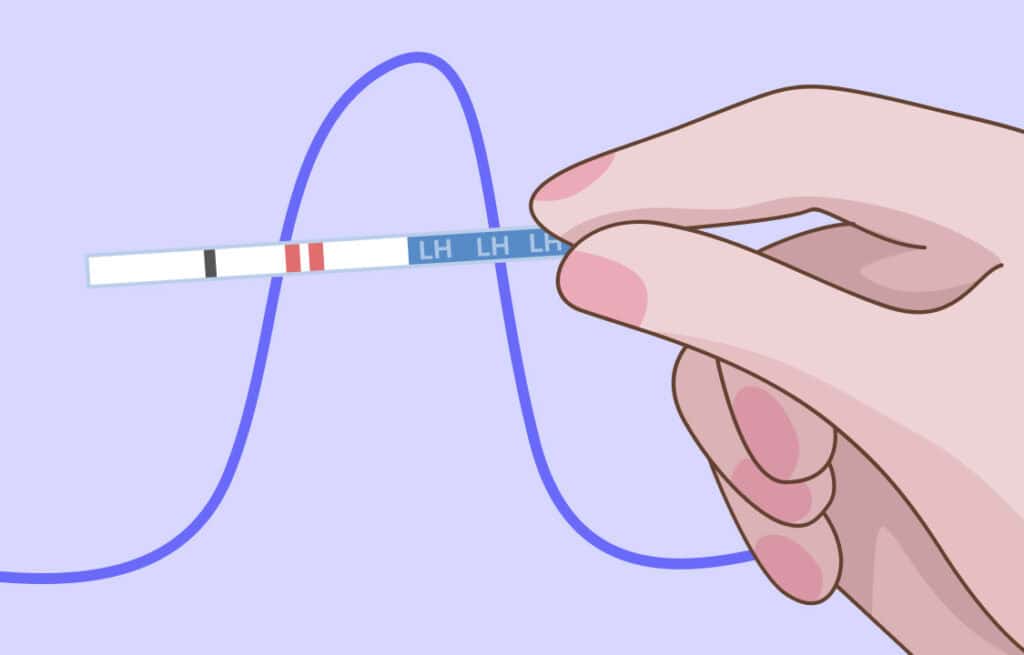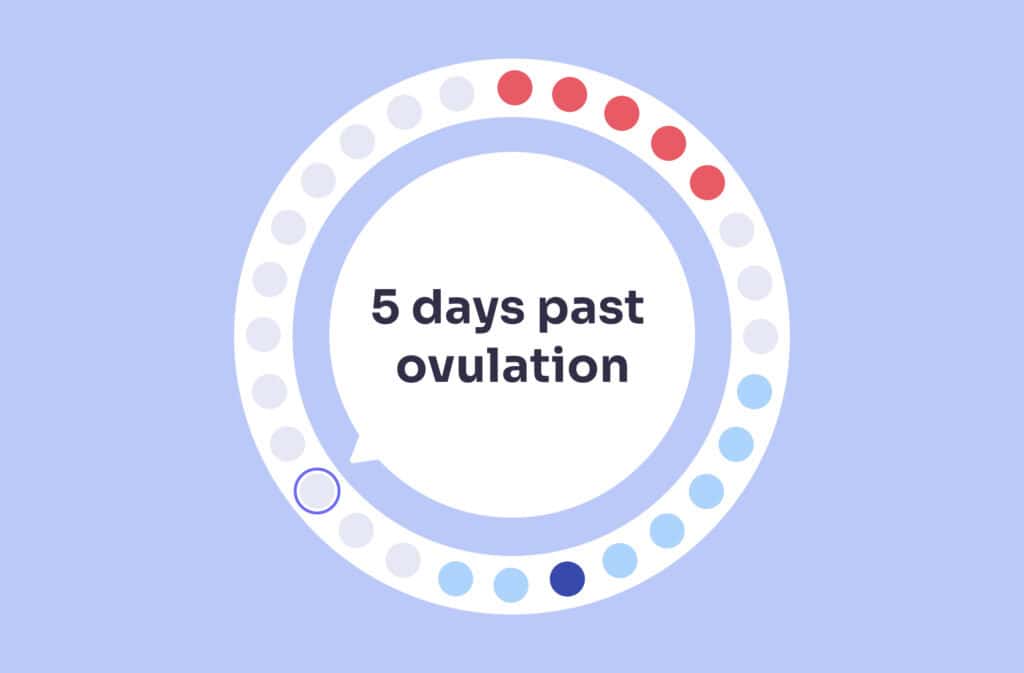Femia > Health Library > Pregnancy > Pregnancy week by week > 31 Weeks pregnant: Baby growth, symptoms, and preparing for birth
31 Weeks pregnant: Baby growth, symptoms, and preparing for birth

- Updated Feb 14, 2025
- Published
CRAFTED BY HUMAN
Crafted by human At Femia, we provide accurate and up-to-date information at every stage of your journey, from trying to conceive, pregnancy and postnatal support. All content is created by a real person based on in-depth research and own professional experience. Femia ensures that you will receive expert advice, strict accuracy and a personalized approach from our authors/medical experts. Learn more about our editorial policy.
FACT CHECKED
Fact checked At Femia Health, we maintain the highest standards of editorial excellence in delivering content focused on helping you conceive, guiding you through pregnancy, and supporting you postpartum. Explore our content review principles to learn how we ensure the accuracy and quality of our health and lifestyle tips for every stage of your journey.
At 31 weeks pregnant, your baby is about the size of a coconut, and developing critical survival skills like breathing and sucking, while you may experience stronger symptoms like Braxton Hicks contractions or back pain. Breathing techniques and self-care are key to managing this stage.
Welcome to week 31 of your pregnancy! At this stage, your baby is continuing to grow rapidly, and practicing important skills like breathing and sucking. For you, symptoms may intensify as your baby takes up more space. Understanding what’s happening with your body and your baby this week will help you navigate the journey with confidence.
Monitor your health and your baby’s growth throughout pregnancy with Femia
Pregnancy symptoms at 31 weeks
Back pain
At 31 weeks pregnant, back pain becomes a common complaint due to your growing belly and changes in posture. As your baby grows, the weight gain and shifting of your center of gravity can place additional strain on your back muscles. This can lead to discomfort or soreness, particularly in the lower back. To alleviate back pain, consider practicing good posture, using support cushions, and engaging in gentle stretching exercises. A maternity belt can also provide support and help relieve some of the pressure on your back.
Swelling (Edema)
Swelling in the feet, ankles, and hands is common during the third trimester, particularly around 31 weeks. This is due to increased fluid retention in your body, which can be worsened by standing for long periods or warm weather. While some swelling is normal, try to elevate your feet when possible, drink plenty of water, and avoid tight clothing around your wrists and ankles. If you notice sudden swelling in your face or hands or if the swelling is severe, contact your healthcare provider to rule out any complications, such as preeclampsia.
Shortness of breath
At 31 weeks pregnant, many women begin to feel shortness of breath as their uterus expands. The growing uterus can push against the diaphragm, making it harder to take deep breaths. This sensation may intensify if you are engaging in physical activity or lying on your back. To help manage shortness of breath, try sitting up straight, taking slower breaths, and avoiding activities that may leave you feeling winded. If the shortness of breath becomes persistent or occurs alongside other symptoms like dizziness or chest pain, reach out to your healthcare provider.
Fatigue
At 31 weeks, you may begin to feel more fatigued as your body works overtime to support your growing baby. The rapid growth of your baby, changes in your hormones, and physical strain can leave you feeling more tired than usual. To combat pregnancy fatigue, ensure you’re getting enough rest, eating nutrient-dense foods, and staying hydrated. Light exercise, like walking, can also boost your energy levels, but listen to your body and avoid overexertion.
Braxton Hicks contractions vs true labor
| Aspect | Braxton Hicks Contractions | True Labor |
|---|---|---|
| Frequency | Irregular, not progressively closer together | Regular intervals, getting closer together |
| Intensity | Weak, often described as mild discomfort | Increases in strength over time |
| Duration | Short, usually lasting less than 30 seconds | Longer, lasting 30-70 seconds per contraction |
| Location of Pain | Felt mainly in the front of the abdomen | Starts in the back and radiates to the front |
| Effect of Movement | Stops or decreases with activity or a change in position | Continues regardless of movement or position changes |
| Cervical Changes | Does not cause dilation or thinning of the cervix | Causes the cervix to dilate and thin out (effacement) |
👉Find out more: 30 Weeks pregnant: Baby growth, symptoms, and labor prep
Symptoms not to ignore at 31 weeks
Regular, painful contractions
At 31 weeks pregnant, you might experience Braxton Hicks contractions, which are generally harmless and often referred to as “practice contractions.” However, if you start experiencing regular, painful contractions that do not go away or intensify, this could be a sign of preterm labor. Preterm labor occurs when your body starts to prepare for delivery before 37 weeks, which can increase the risk of complications for both you and your baby.
Signs of preterm labor include:
- contractions that occur every 10 minutes or more frequently
- other symptoms like lower back pain, pelvic pressure, or changes in vaginal discharge.
It’s crucial not to ignore these signs. If you experience regular, painful contractions, contact your healthcare provider immediately. Early intervention can help delay labor and provide necessary care to improve outcomes for your baby.
Severe swelling
Swelling is common during pregnancy, but severe swelling, particularly in the face, hands, and legs, can be a sign of preeclampsia. Preeclampsia is a pregnancy complication characterized by high blood pressure and damage to organs, typically the kidneys. If left untreated, it can cause serious health problems for both the mother and baby, including restricted blood flow to the placenta, which could affect fetal growth.
Signs of severe swelling to watch for include puffiness or tightness in the face, hands, or around the eyes, especially if it’s sudden or sudden-onset. If you notice swelling along with other symptoms such as high blood pressure, headaches, visual disturbances (like blurry vision), or pain in the upper right abdomen, contact your healthcare provider immediately. Monitoring and treating preeclampsia as early as possible is crucial for preventing complications like eclampsia or placental abruption.
Reduced baby movements
By 31 weeks, your baby’s movements should be noticeable and consistent. If you notice a significant decrease in your baby’s movements, it could indicate potential issues with the pregnancy, such as fetal distress or placental problems. A reduced fetal movement count could signal that your baby is not getting enough oxygen or nutrients, which could be a sign of a problem that requires immediate attention.
Your body at 31 weeks pregnant
At 31 weeks pregnant, your body is undergoing significant changes as your baby continues to grow rapidly. Your uterus has expanded to about 4-5 inches above your belly button, making your bump more noticeable and harder to hide. You might also begin to feel stronger, more pronounced kicks, rolls, and jabs from your baby as they get bigger and stronger. These movements can feel more intense and might even be visible from the outside.
Your weight gain during this time typically falls between 20-30 pounds, depending on your pre-pregnancy weight and any underlying health factors. As your body works hard to support your growing baby, your breasts may become larger and more tender, and you might notice increased pressure on your bladder as your uterus presses down on surrounding organs. At the same time, your body is preparing for labor by producing more blood and fluid to support both you and your baby in the final stretch.
31 weeks pregnant in months
You’re about 7.5 to 8 months pregnant, with roughly nine weeks to go.
31 weeks pregnant belly
Your belly may feel heavier and more round, and your skin might stretch and itch. Moisturizing regularly can help reduce discomfort.
Baby development at 31 weeks of pregnancy
At 31 weeks, your baby is experiencing major growth. The baby’s lungs are almost fully developed, which means they are getting ready to breathe on their own after birth. Their brain is also growing rapidly, making critical connections that will help with their development after birth. The baby is now gaining more fat under their skin, which helps smooth out their body, making them appear less wrinkled and more round. This fat also helps regulate body temperature after birth.
31-Week baby size
At 31 weeks, your baby is approximately 16 inches long and weighs around 3.3 pounds, roughly the size of a coconut. The size and weight will continue to increase over the next few weeks as the baby prepares for life outside the womb.
31-Weeks baby position
By 31 weeks, most babies are positioned head-down in preparation for birth. However, if your baby is still moving around, don’t worry—there is still time for them to settle into the head-down position.
31-Week ultrasound
A 31-week ultrasound may be performed to monitor your baby’s growth, check amniotic fluid levels, and assess their position. This scan offers a detailed view of their developing facial features and movements.
Monitor your health and your baby’s growth throughout pregnancy with Femia
31-Week preemie: What to expect
Can a baby survive being born at 31 weeks? A baby born at 31 weeks is considered very premature but has a 95% or higher survival rate with proper NICU care.
Development highlights
- Lungs: Still maturing but producing surfactant to support breathing.
- Brain: Rapid growth supports cognitive and motor skills.
- Reflexes: Sucking and swallowing are developing but may need time.
Care in the NICU
- Breathing support: Often needed via CPAP or a ventilator.
- Feeding: Provided through a tube until the baby can feed orally.
- Temperature regulation: Incubators help maintain warmth.
With medical care and follow-up, most 31-week preemies thrive and catch up to their peers by school age.
Tests to expect at 31 weeks pregnant
Your healthcare provider will continue to monitor your health and your baby’s progress with routine tests:
- Blood pressure monitoring: Screens for hypertension or preeclampsia.
- Fetal heartbeat and movements: Your provider will listen to your baby’s heartbeat and ask about their activity.
- Urine test: Checks for protein and glucose, which can indicate preeclampsia or gestational diabetes.
- Fundal height measurement: Ensures your uterus is growing appropriately.
- Ultrasound (if needed): May be recommended to check the growth or the baby’s position.
These tests are critical for ensuring your baby’s health and identifying potential complications. Always report any unusual symptoms to your provider.
👉Find out more:
32 Weeks pregnant: Baby’s growth, your body, and what to watch for
33 Weeks pregnant: Fetal milestones, labor prep, and decision-making
Health tips and self-care at 31 weeks pregnant
As you move into the third trimester, your body is preparing for the final stages of pregnancy, and self-care becomes even more essential for your well-being. Here are some health tips and self-care strategies to help you stay comfortable and take care of yourself at 31 weeks pregnant:
Keep an eye on your weight gain
At 31 weeks, most women have gained between 20 to 30 pounds, but keep in mind that everyone’s weight gain is different. Regular check-ups with your healthcare provider will help ensure that your weight is on track and that you are gaining a healthy amount. If you notice a sudden increase in weight or swelling, discuss it with your provider as it could indicate preeclampsia.
Practice breathing techniques
Breathing exercises are incredibly helpful, both for relieving discomfort now and for preparing for labor. Try practicing controlled breathing to help with shortness of breath and any stress or anxiety you may experience. These techniques can help you relax, reduce tension, and stay focused during labor.
Stay hydrated
Staying hydrated is crucial, especially as your blood volume increases. Aim for at least 10-12 glasses of water each day. Hydration will also help reduce swelling, support your kidneys, and keep your body functioning well during pregnancy. Adding electrolytes or drinking coconut water can be beneficial in staying balanced.
Elevate your feet
Swelling in your feet and ankles is common at this stage. Elevating your feet for 15 to 20 minutes a few times a day can help improve circulation and reduce swelling. Propping your feet up while sitting or lying down can also help you feel more comfortable.
Use pillows for support
As your belly grows, sleeping and sitting can become uncomfortable. A pregnancy pillow can provide the support you need to relieve pressure on your back, hips, and belly. Use it to help you sleep more soundly and support your posture during the day while sitting. Adding extra pillows for your lower back or between your knees can also help alleviate discomfort.
These tips can make a big difference in how you feel during the 31st week of pregnancy, allowing you to relax and enjoy the final weeks of this exciting journey.
Questions from the Femia community
Do breathing techniques for pain relief work?
Yes, breathing techniques are an effective way to manage pain during labor by helping you relax and stay focused. Techniques like slow, deep breathing can calm your nervous system, while patterned breathing (e.g., short breaths followed by a long exhale) can provide rhythmic relief during contractions. Regular practice before labor can increase your confidence and make these techniques feel second nature. Additionally, breathing deeply during pregnancy can help with relaxation and improve oxygen flow to your baby.
What week does a baby gain the most weight?
Babies typically gain the most weight in the third trimester, particularly between 32 to 36 weeks.
What to avoid at week 31?
Avoid lying flat on your back for extended periods, heavy lifting, and eating too much salt, which can cause swelling.
How do I know my baby is okay at 31 weeks pregnant?
Monitor for regular movement; a decrease in movement may indicate a need to contact your doctor. Regular check-ups, ultrasounds, and monitoring fetal heart rate also help ensure your baby’s well-being.
What complications can you have at 31 weeks pregnant?
Possible complications at 31 weeks include preeclampsia, gestational diabetes, premature labor, or issues with fetal growth. Regular check-ups help identify and manage these risks.
The bottom line
At 31 weeks pregnant, your baby is developing critical survival skills, and your body is adapting to their rapid growth. Focus on managing symptoms, practicing breathing techniques, and preparing for labor as you navigate the final weeks of pregnancy.
References
- “31 Weeks Pregnant: Symptoms, Baby Development & Tips.” BabyCenter, www.babycenter.com/pregnancy/week-by-week/31-weeks-pregnant.
- “Week 31 of Pregnancy: Symptoms, Baby Development & More.” What to Expect, www.whattoexpect.com/pregnancy/week-by-week/week-31.aspx.
- “31 Weeks Pregnant: Baby Development, Symptoms & Tips.” NHS, www.nhs.uk/pregnancy/week-by-week/1-to-12/31-weeks/.
- “Pregnancy Week 31: What to Expect.” American Pregnancy Association, www.americanpregnancy.org/healthy-pregnancy/week-by-week/31-weeks-pregnant/.

Learn what’s normal, how to reduce swelling, and when to seek urgent medical care for serious conditions like preeclampsia or blood clots.

Discover if an ovulation test can detect pregnancy, why you might get a faint positive, and answers to common questions about using ovulation tests during pregnancy.

Discover the symptoms at 5 days past ovulation (5 DPO), signs of pregnancy, and find out why it’s still too early for accurate pregnancy test results. Expert advice from Femia.

